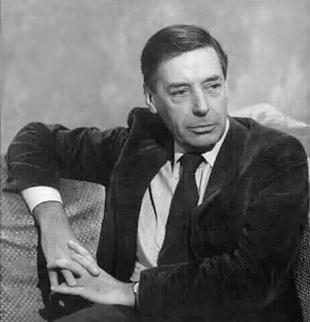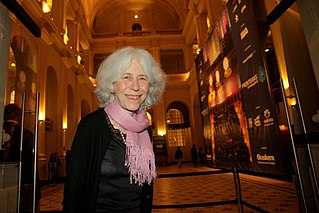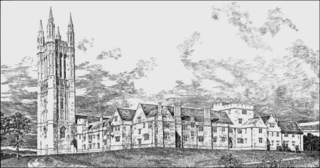Related Research Articles

Harvard College is the undergraduate college of Harvard University, a private Ivy League research university in Cambridge, Massachusetts. Part of the Faculty of Arts and Sciences, Harvard College is Harvard University's traditional undergraduate program, offering AB and SB degrees. It is highly selective, with fewer than four percent of applicants being offered admission as of 2022.

The Hoover Institution is an American public policy research institution that promotes personal and economic liberty, free enterprise, and limited government. While the institution is formally a unit of Stanford University, it maintains an independent board of overseers and relies on its own income and donations. Fellowship appointments do not require the approval of Stanford tenure committees. It is widely described as a conservative institution, although its directors have contested its partisanship.

Martha Craven Nussbaum is an American philosopher and the current Ernst Freund Distinguished Service Professor of Law and Ethics at the University of Chicago, where she is jointly appointed in the law school and the philosophy department. She has a particular interest in ancient Greek and Roman philosophy, political philosophy, existentialism, feminism, and ethics, including animal rights. She also holds associate appointments in classics, divinity, and political science, is a member of the Committee on Southern Asian Studies, and a board member of the Human Rights Program. She previously taught at Harvard and Brown.

Darwin College is a constituent college of the University of Cambridge. Founded on 28 July 1964, Darwin was Cambridge University's first graduate-only college, and also the first to admit both men and women. The college is named after one of the university's most famous families and alumni, that of Charles Darwin. The Darwin family previously owned some of the land, Newnham Grange, on which the college now stands.

Abbott Lawrence Lowell was an American educator and legal scholar. He was President of Harvard University from 1909 to 1933.

George Caspar Homans was an American sociologist, founder of behavioral sociology, a president of the American Sociological Association, and one of the architects of social exchange theory. Homans is best known in science for his research in social behavior and his works The Human Group, Social Behavior: Its Elementary Forms, his contributions to exchange theory, and the different propositions he developed to explain social behavior. He is also the third great grandson of the second President of the United States, John Adams.

Sir Bernard Arthur Owen Williams, FBA was an English moral philosopher. His publications include Problems of the Self (1973), Ethics and the Limits of Philosophy (1985), Shame and Necessity (1993), and Truth and Truthfulness (2002). He was knighted in 1999.

Lawrence Joseph Henderson was an American physiologist, chemist, biologist, philosopher, and sociologist. He became one of the leading biochemists of the early 20th century. His work contributed to the Henderson–Hasselbalch equation, used to calculate pH as a measure of acidity.

Emma Georgina Rothschild is a British economic historian, a professor of history at Harvard University. She is director of the Joint Centre for History and Economics at Harvard, and an honorary Professor of History and Economics at the University of Cambridge. She formerly served as board member of United Nations Foundation and as a professor at the École des hautes études en sciences sociales (EHESS) in Paris.
The Thouron Award is a postgraduate scholarship established in 1960 by Sir John R.H. Thouron, K.B.E., and Esther du Pont Thouron. It was created to strengthen the "special relationship" between the United States and the United Kingdom through educational exchange between British universities and the University of Pennsylvania. Through the programme the Thourons sought to nourish and develop Anglo-American friendship by ensuring that, in the years to come, a growing number of the leading citizens of these two countries would have a thorough understanding of their trans-Atlantic neighbours. In the years since its founding, the Thouron Award has sponsored programs of graduate study for more than 650 fellows, known as Thouron Scholars.

Gwilym Ellis Lane Owen was a British classicist and philosopher who is best known as a scholar of ancient philosophy. He was a specialist on the work of the Greek philosopher Aristotle.
Academica Press is a scholarly and trade publisher of non-fiction, particularly research in the social sciences, humanities, education, law, public policy, international relations, and other disciplines. Founded by Robert Redfern-West and managed by him in the United States until 2017, it is now operated by a privately owned limited liability corporation and internationally focused. Its President and Publisher is the historian and critic Paul du Quenoy. In addition to its main list of publications, Academica publishes several imprints in subject areas of special interest, including St. James's Studies in World Affairs, W. B. Sheridan Law Books, Bethesda Scientific, and an Irish studies series under the imprint of Maunsel, the original publisher of James Joyce and William Butler Yeats.
Giving What We Can (GWWC) is an effective altruism-associated organisation whose members pledge to give at least 10% of their income to effective charities. It was founded at Oxford University in 2009 by the philosopher Toby Ord, physician-in-training Bernadette Young, and fellow philosopher William MacAskill.
This outline is provided as an overview of, and topical guide to Harvard University:

Amélie Oksenberg Rorty was a Belgian-born American philosopher known for her work in the philosophy of mind, history of philosophy, and moral philosophy.

What was originally called Harvard College (around which Harvard University eventually grew) held its first Commencement in September 1642, when nine degrees were conferred. Today some 1700 undergraduate degrees, and 5000 advanced degrees from the university's various graduate and professional schools, are conferred each Commencement Day.

Jane Eliza Procter Fellowships are scholarships supporting academic research at Princeton University. The Fellowships were endowed by William Cooper Procter in 1921–22, and named after his wife, Jane Eliza Johnston Procter (1864–1953). The original terms of the Fellowships were for three awards, "each with an annual stipend of two thousand dollars, upon which each year two British and one French scholar will have the privilege of residence in the Princeton Graduate College, and of pursuing advanced study and investigation". The Fellowships were to be appointed annually on the recommendation of the University of Oxford, the University of Cambridge, and the École Normale Supérieure.

Edward Kennard RandFBA, known widely as E.K. Rand or to his peers as EKR, was an American classical scholar and medievalist. He served as the Pope Professor of Latin at Harvard University from 1901 until 1942, during which period he was also the Sather Professor at the University of California, Berkeley, for two terms. Rand is best known for his 1928 work, Founders of the Middle Ages.
References
- ↑ "About the Society of Fellows". sites.fas.harvard.edu. Retrieved 2018-11-20.
- 1 2 Tenner, Edward. "Environment for Genius? Harvard University's Society of Fellows". Harvard Magazine, November/December, 1998.
- 1 2 3 Homans, George Caspar (1984). Coming to My Senses: The Autobiography of a Sociologist. New Brunswick & London: Transaction Publishers. p. 119. ISBN 9781412819879.
- ↑ Bloom, Samuel William; Bloom, Samuel W. (2002). The Word as Scalpel: A History of Medical Sociology. Oxford: Oxford University Press. p. 299. ISBN 9780195149296.
- ↑ Henderson, Lawrence Joseph (1970). Barber, Bernard (ed.). L. J. Henderson on the Social System: Selected Writings. Chicago: University of Chicago Press. p. 7. ISBN 978-0226326894.
- ↑ HOMANS, George; BAILEY, ORVILLE (January 1949). "THE SOCIETY OF FELLOWS AT HARVARD UNIVERSITY". American Scientist. 37 (1): 91–106. Retrieved 24 November 2022.
- 1 2 Brinton, Crane, ed. (1959). The Society of Fellows. Harvard University Press. p. 21.
- 1 2 "Harvard University Society of Fellows". Harvard University. Retrieved 20 November 2018.
- ↑ Homans, George C.; Bailey, Orville T. (1949). "The Society of Fellows at Harvard University". American Scientist. 37 (1): 91–106. JSTOR 29773658.
- ↑ Nussbaum, Martha C. Cultivating Humanity: A Classical Defense of Reform in Liberal Education. Cambridge, MA: Cambridge University Press, 1997. pp. 6–7.
- ↑ "Current Senior Fellows". socfell.fas.harvard.edu. Retrieved 2020-05-14.